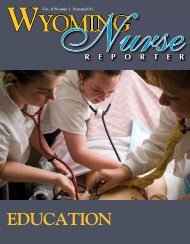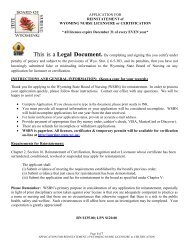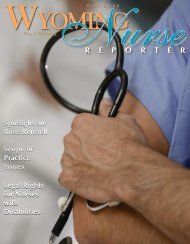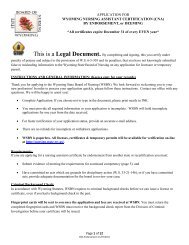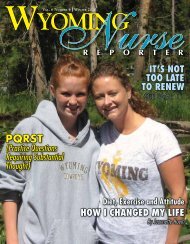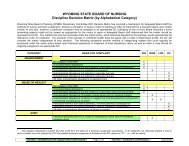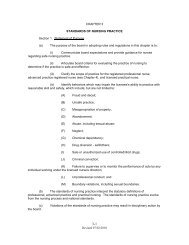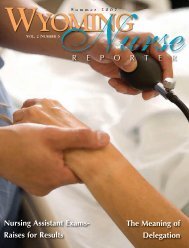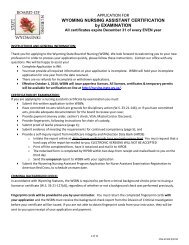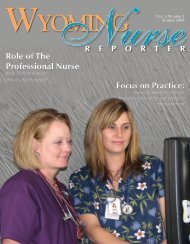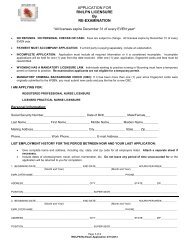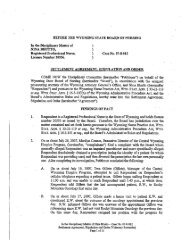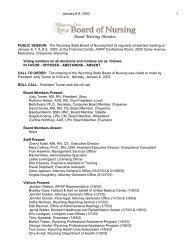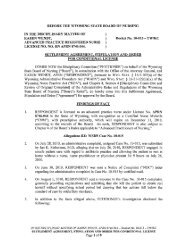Nurse Reporter Spring 2009 - Wyoming State Board of Nursing
Nurse Reporter Spring 2009 - Wyoming State Board of Nursing
Nurse Reporter Spring 2009 - Wyoming State Board of Nursing
You also want an ePaper? Increase the reach of your titles
YUMPU automatically turns print PDFs into web optimized ePapers that Google loves.
Have you ever been lost in time while cleaning an out an attic, closet or basement as you look through old pictures? That is what is happening<br />
to us at the WSBN as we sift through old applications. We wonder about the stories that these nurses could tell! Above are some pictures found<br />
in license application folders <strong>of</strong> staff and members <strong>of</strong> the WSBN. Have some fun as you try to identify these nurses!!! Please send a picture<br />
<strong>of</strong> yourself at the “dawn” <strong>of</strong> your nursing career. Tell us how things have changed (or not changed) since the beginning <strong>of</strong> your nursing career.<br />
Send images (PDF preferred) to mstepa@state.wy.us or to the <strong>Wyoming</strong> <strong>State</strong> <strong>Board</strong> <strong>of</strong> <strong>Nursing</strong>, 1810 Pioneer Ave., Cheyenne, WY 82002.<br />
Question: We reviewed the <strong>Nurse</strong> Practice<br />
Act and are writing for clarification <strong>of</strong><br />
whether administration <strong>of</strong> medications is something<br />
that RN or APRN can delegate to CNA<br />
under direct supervision. For example, can we<br />
train CNAs to administer injections?<br />
Answer: It is not appropriate to delegate the<br />
injection <strong>of</strong> medications to a CNA. Administration<br />
<strong>of</strong> medications, at this point, is not<br />
within the CNA’s range <strong>of</strong> functions according<br />
to the <strong>Wyoming</strong> Practice Act and Administrative<br />
Rules and Regulations. For specific details<br />
about the basic nursing functions, tasks and<br />
skills that may be delegated, refer to the Rules<br />
and Regulations, Chapter VII, Section 8.<br />
However, according to Advisory Opinion 05-<br />
150, “after delegation by a Registered <strong>Nurse</strong><br />
(RN) to a Certified <strong>Nursing</strong> Assistant (CNA),<br />
the CNA may assist the client with self-administered<br />
medications following the criteria listed<br />
below:<br />
The assistance that may be provided:<br />
•Reminding the client to take medications;<br />
•Removing medication container from<br />
storage;<br />
•Assisting with removal <strong>of</strong> a cap;<br />
•Assisting with the removal <strong>of</strong> a medication<br />
from a container for clients with a disability<br />
(i.e., arthritis) which prevents independence<br />
in this act; and<br />
•Observing the client take the medication<br />
Prescription medications shall be dispensed<br />
from a licensed pharmacist, labeled with the<br />
following:<br />
PRACTICE QUESTIONS<br />
Mary Beth Stepans, PhD, RN is the Practice and Education Consultant for the <strong>Wyoming</strong> <strong>State</strong> <strong>Board</strong> <strong>of</strong> <strong>Nursing</strong>.<br />
•Names, address and phone number <strong>of</strong> the<br />
pharmacy<br />
•Name <strong>of</strong> client<br />
•Name and strength <strong>of</strong> drug<br />
•Directions for use<br />
•Date filled<br />
•Expiration date<br />
•Prescription number<br />
•Name <strong>of</strong> physician<br />
•Controlled substances shall have a warning<br />
label on the bottle<br />
• The RN maintains accountability and responsibility<br />
for supervision and management <strong>of</strong> all<br />
medication administration” (Advisory Opinion<br />
05-150: Assistance with the Self-Administration<br />
Of Medications—CNA).<br />
Question: I’m confused about Master’s prepared<br />
RNs calling themselves Advanced<br />
Practice Registered <strong>Nurse</strong>s (APRN) despite not<br />
holding APRN recognition in the <strong>State</strong> <strong>of</strong> <strong>Wyoming</strong><br />
nor having passed an advanced practice<br />
certification. I am concerned that this is a false<br />
representation to patients and the staff. Is this<br />
correct?<br />
Answer: According to the <strong>Nurse</strong> Practice<br />
Act (NPA), “Advanced Practice Registered<br />
<strong>Nurse</strong>” is defined as follows:<br />
(i) “Advanced practice registered nurse<br />
(APRN)” means a nurse who:<br />
(A) May prescribe, administer, dispense or<br />
provide nonprescriptive and prescriptive medications<br />
including prepackaged medications,<br />
except schedule I drugs as defined in W.S. 35-7-<br />
1013 and 35-7-1014;<br />
(B) Has responsibility for the direct care and<br />
management <strong>of</strong> patients and clients in relation<br />
to their human needs, disease states and therapeutic<br />
and technological interventions;<br />
(C) Has a master’s degree in nursing, or an advanced<br />
practice registered nurse specialty or has<br />
completed an accredited advanced practice registered<br />
nurse educational program prior to January<br />
1, 1999; and<br />
(D) Has completed an advanced program <strong>of</strong><br />
study in a specialty area in an accredited nursing<br />
program, has taken and passed a national certification<br />
examination in the same area and has<br />
been granted recognition by the board to practice<br />
as an APRN (NPA 33-21-120).<br />
In addition, “title protection” is outlined in the<br />
law:<br />
“(b) Any person who holds a license to practice<br />
as an advanced practice registered nurse<br />
in this state shall have the right to use the title<br />
“Advanced Practice Registered <strong>Nurse</strong>” and the<br />
abbreviation “A.P.R.N.” No other person shall<br />
assume this title or use this abbreviation or any<br />
words, letters, signs or devices to indicate that<br />
the person using same is an advance practice<br />
registered nurse” [NPA 33-21-134, (b)].<br />
It is not required by <strong>Wyoming</strong> law that Clinical<br />
<strong>Nurse</strong> Specialists (CNSs) be licensed as APRNs<br />
but a CNS or other master’s prepared RN cannot<br />
legally use the title “APRN” unless granted<br />
APRN recognition by the WSBN. The behavior<br />
you describe constitutes misrepresentation<br />
and violation <strong>of</strong> title protection.<br />
24 Wy o m i n g Nu r s e Re p o r t e r



